
The wandering whistling duck is a species of whistling duck. They inhabit tropical and subtropical Australia, the Philippines, Borneo, Indonesia, Papua New Guinea, and the Pacific Islands.

Macrothele is a genus of mygalomorph spiders in the family Macrothelidae, and was first described by A. Ausserer in 1871. Most of the species in the genus occur in Asia, from India to Japan, and Java, with five found in Africa, and two in Europe. The name is derived from Ancient Greek μακρός ("makro-"), meaning "big", and θηλή ("thele"), referring to the spinnerets.

Evarcha arcuata is a species of jumping spiders with a palearctic distribution.
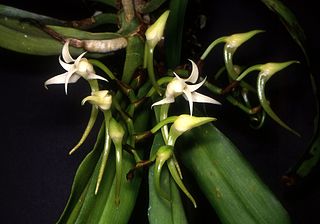
Cyrtorchis is a genus of flowering plants from the orchid family Orchidaceae native to Africa.

Corythucha arcuata, the oak lace bug, is a species of Tingidae that is a pest of oaks. It is native to the New World, and was first observed in Europe in 2000.

Diodora arcuata, common name the arcuate limpet, is a species of sea snail, a marine gastropod mollusk in the family Fissurellidae, the keyhole limpets.
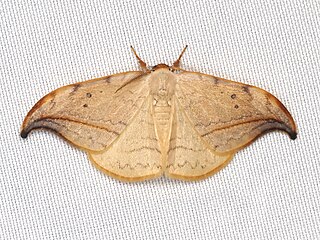
Drepana arcuata, the arched hooktip or masked birch caterpillar, is a moth of the family Drepanidae. The species was first described by Francis Walker in 1855. It is found from Newfoundland to Vancouver Island, south to at least North Carolina, South Carolina and California.

Cassinia arcuata, commonly known as drooping cassinia, biddy bush, Chinese scrub, sifton bush and Chinese shrub, is a species of flowering plant in the family Asteraceae and is endemic to Australia. It is a shrub, sometimes a small tree with sessile, linear leaves, and heads of up to two hundred brownish flowers arranged in pyramid-shaped panicles. In New South Wales, the species is known as Cassinia sifton. In disturbed areas, C. arcuata can become weedy.

Pyrgotis arcuata is a species of moth of the family Tortricidae. It is endemic to New Zealand.

Luzula arcuata is a species of flowering plant in the rush family Juncaceae with the modern common name curved wood-rush. The plant is native to mountains of northern Europe, north-western and north-eastern Asia and north-western North America.

Macracantha is a genus of Asian orb-weaver spiders recognized as containing the species, Macracantha arcuata., although some schemes also recognise inclusion of Gasteracantha hasselti in this genus. Macracantha is notable for the extremely long, curved spines on the abdomens of female members of the genus; Eugène Simon created the taxon name from the Greek words μακρός and ἄκανθα (spine). It occurs from India and China through Southeast Asia to Indonesia.

Milichiella is a genus of freeloader flies in the family Milichiidae.
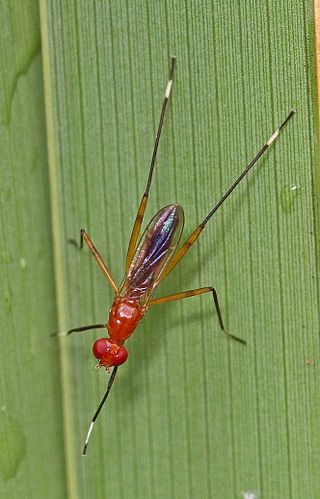
Grallipeza is a genus of stilt-legged flies in the family Micropezidae. There are at least 40 described species in Grallipeza.
Polacantha arcuata is a species of robber flies in the family Asilidae.
Milichiella lacteipennis is a species of freeloader flies in the family Milichiidae.
Cutina arcuata, the curve-lined cutina moth, is a species of moth in the family Erebidae. It is found in North America.
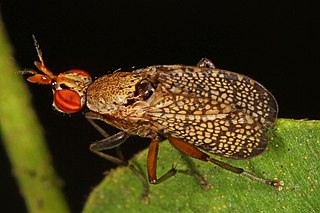
Euthycera arcuata is a species of marsh fly in the family Sciomyzidae.
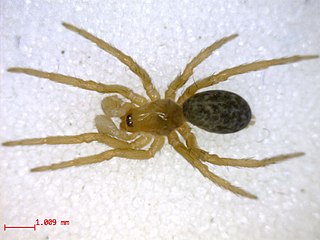
Cicurina arcuata is a species of true spider in the family Hahniidae. It is found in the United States and Canada.
Dolichandrone arcuata, known in Malayalam as pambukaimaram, is a deciduous tree in the Bignoniaceae family. This species is native to the dry, deciduous forests of the Eastern Ghats in the Indian subcontinent. It is a medium-sized tree, reaching up to 16 m (52 ft) in height.
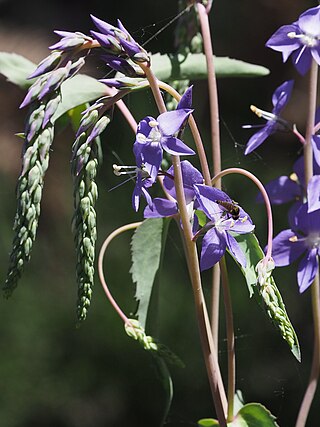
Veronica arcuata is a flowering plant species in the family Plantaginaceae. It is native to northern New South Wales. The lilac coloured flowers are showy and conspicuous from late spring to late summer.
















